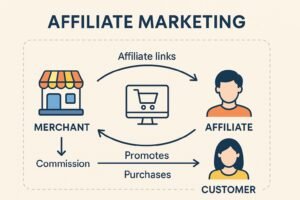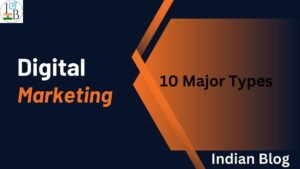Digital marketing has transformed the way businesses promote their products and services. With the increasing use of technology and the internet, digital marketing has become an essential part of any company’s marketing strategy. In this blog, we’ll explore what digital marketing is, why it’s important, and how businesses can effectively leverage digital channels to connect with customers and drive growth.
What is Digital Marketing?
Digital marketing is the use of digital channels to promote a product or service, increase brand awareness, and connect with customers online. These digital channels include websites, social media platforms, search engines, email, mobile apps, and other digital tools and technologies. The goal of digital marketing is to reach potential customers through these channels and convince them to take a desired action, such as making a purchase, filling out a form, or signing up for a newsletter.
Why is Digital Marketing Important?
Digital marketing is important for several reasons. First, it provides businesses with a cost-effective way to reach a large audience. Unlike traditional marketing methods, such as print ads or TV commercials, digital marketing allows businesses to target specific demographics and measure the effectiveness of their campaigns in real-time. Second, digital marketing helps businesses build and maintain relationships with customers. By engaging with customers on social media or through email, businesses can establish a sense of trust and loyalty that can lead to repeat business and positive word-of-mouth referrals. Finally, digital marketing is essential for staying competitive in today’s digital landscape. As more and more consumers turn to the internet to research products and services, businesses that don’t have a strong online presence risk being left behind.
Effective Digital Marketing Strategies
So, what does it take to create an effective digital marketing strategy? Here are some key tactics businesses can use to leverage digital channels and connect with customers:
Search Engine Optimization (SEO)
SEO is the practice of optimizing website content to improve its ranking and visibility in search engine results pages (SERPs). By optimizing for relevant keywords and creating high-quality, user-friendly content, businesses can increase their organic search traffic and attract potential customers to their website. For example, let’s say you run a small business that sells handmade jewelry. By optimizing your website for keywords like “handmade jewelry” and “artisan jewelry,” you can increase your chances of appearing at the top of search results when people search for those terms. This, in turn, can help drive traffic to your website and increase your chances of making a sale.
Social Media Marketing (SMM)
SMM is the use of social media platforms to promote products or services, build brand awareness, and engage with customers. By creating a strong social media presence and regularly posting relevant, high-quality content, businesses can establish themselves as thought leaders in their industry and connect with potential customers on a more personal level. For example, let’s say you run a health and wellness business. By using social media to share healthy recipes, workout tips, and motivational quotes, you can build a loyal following of customers who are interested in your brand and may be more likely to purchase your products.
Pay-Per-Click Advertising (PPC)
PPC is a digital advertising model where advertisers pay a fee each time their ad is clicked. This includes platforms such as Google Ads and social media advertising. With PPC, businesses can target specific demographics and keywords to reach potential customers who are actively searching for products or services like theirs. For example, let’s say you run an e-commerce store that sells athletic gear. By using PPC to target keywords like “running shoes” or “fitness apparel,” you can reach people who are actively looking for products in your niche and increase your chances of making a sale.
Content Marketing
Content marketing is the creation and sharing of valuable, relevant content to attract and retain a clearly defined audience. This can include blog posts, e-books, infographics, videos, and more. By creating informative, engaging content that addresses the needs and interests of your target audience, businesses can establish themselves as experts in their industry and build trust with potential customers. For example, let’s say you run a software company that specializes in project management tools. By creating a blog post that explains how to streamline project management processes, you can attract potential customers who are searching for solutions to their project management challenges. By providing valuable information and positioning your company as an authority in the space, you increase your chances of converting those visitors into paying customers.
Email Marketing
Email marketing is the practice of sending promotional messages via email to increase customer engagement, retention, and sales. By collecting email addresses from website visitors, customers, and other contacts, businesses can send targeted messages that promote their products or services, offer exclusive deals or discounts, and provide helpful information or resources. For example, let’s say you run an online clothing store. By sending targeted email campaigns to customers who have previously purchased from your store, you can encourage repeat business and build customer loyalty. By offering personalized recommendations based on their past purchases, you can increase the chances of making another sale and keep your brand top-of-mind.
Influencer Marketing
Influencer marketing is the practice of partnering with social media influencers or other industry leaders to promote your products or services. By leveraging the reach and influence of these individuals, businesses can reach a larger audience and increase their credibility and brand awareness. For example, let’s say you run a skincare brand. By partnering with a popular beauty blogger or influencer who has a large following on social media, you can reach a new audience of potential customers who may be interested in your products. By offering exclusive discounts or giveaways through the influencer’s platform, you can incentivize their followers to try your products and increase your chances of making a sale.
Concluding Remark on Digital Marketing
Digital marketing is an essential part of any modern marketing strategy. By leveraging digital channels like SEO, PPC, social media, content marketing, email marketing, and influencer marketing, businesses can reach a large audience and connect with customers on a more personal level. The key to success is to create high-quality, engaging content that resonates with your target audience and provides value. By consistently delivering relevant and helpful information, businesses can establish themselves as trusted authorities in their industry and build long-term relationships with their customers.



